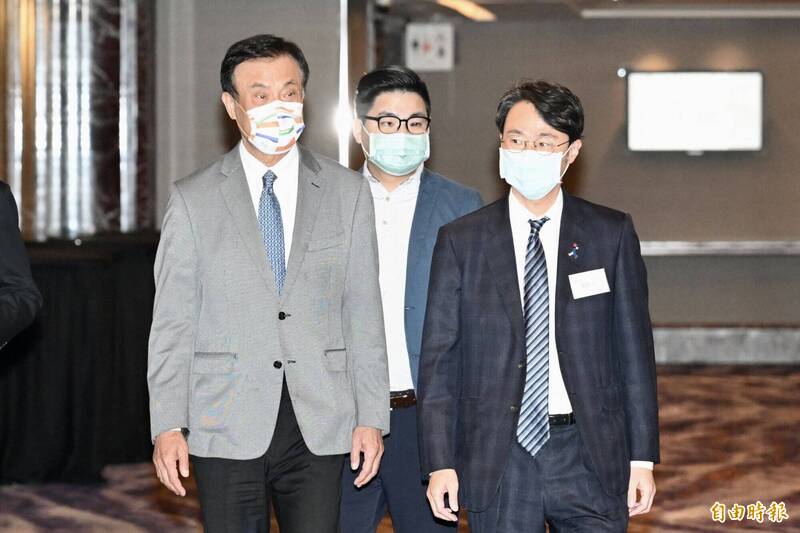The Japan-Taiwan Exchange Association Japan Study Abroad Scholarship Alumni Association was held in Taipei today (5th). Su Jiaquan, president of the Taiwan-Japan Relations Association, attended the meeting. On the right is Sui Hattori, deputy representative of the Japan-Taiwan Exchange Association.
(Photo by reporter Cong Changjin)
[Reporter Lu Yixuan/Taipei Report] The Japan-Taiwan Exchange Association held the "Japan Study Abroad Scholarship Alumni Association" today, inviting recipients of Japan Study Abroad Scholarships for decades to participate. About 200 people participated in the event.
The Japan-Taiwan Association stated that after studying abroad, the scholarship graduates play a pivotal role in all walks of life in Taiwan and the forefront of Japan-Taiwan relations. The organization of this large-scale alumni reunion hopes to deepen exchanges between awardees and promote Japan-Taiwan relations.
Su Jiaquan, president of the Taiwan-Japan Association, said that international students are an important force for the country and hope to connect them at the maximum growth rate. "This year there will be 200 students, and next year the goal will be doubled to 500 students!"
Izumi Yutai, the representative of Japan in Taiwan, is temporarily unable to attend, and the deputy representative Hattori Takayo reads Izumi Yutai's speech.
From 1955 to the present, including the era of the Japanese Government Scholarship for Studying Abroad, a total of about 3,100 Taiwanese students have received Japanese scholarships.
In this long list, there are many names who have made great contributions to Japan-Taiwan relations, including Xu Shikai, Xu Shuide, and Hsieh Chang-ting, three representatives in Japan.
Not only in the field of politics and diplomacy, for example, Mr. Cai Maofeng, who went to Japan to study in 1962, was active in the field of Japanese language education after returning to Taiwan. He was also the first recipient of the medal when Japan awarded the medal to Taiwanese again.
Please read on...
Quan Yutai pointed out that the Japan-Taiwan Exchange Association was established in 1972. At that time, the Japan-Taiwan relationship can be said to have started from the bottom, and then there were peaks and lows. The Japan-Taiwan relationship has become an important partnership for more than 50 years.
Taking advantage of the opportunity of the 50th anniversary of the establishment of the association, the roster of scholarship international students is reorganized. Today, 200 of the 3,100 people gathered here. I hope that everyone will take this opportunity to expand horizontal connections. "There are so many partners. Very precious property!" Quan Yutai also mentioned that many of them are university instructors, and sincerely hope that you will teach students to understand Japan as teachers, and encourage everyone to continue to work together to deepen Japan-Taiwan relations.
Former Chief Justice Lai Haomin received a Japanese National Scholarship to study in Japan in 1966, and currently serves as the honorary chairman of the "Japan Scholarship Association for International Students".
Lai attended the speech and said that studying in Japan has changed his life to a certain extent, and he has learned a lot. If it were not for this experience, he probably would not have become the President of the Judiciary.
Lai said that these studies are especially about interpersonal relationships, such as the Japanese way of thinking, Japanese participation in various activities in the international community, etc. Networking is a special kind of knowledge different from academic ability.
Lai Haomin encouraged his companions present to work together to promote exchanges between Japan and Taiwan; he also reminded the international students who are about to leave that every penny is a tax for the Japanese nationals of a friendly country, and they must cherish it and think of the source when drinking water.
Su Jiaquan, president of the Taiwan-Japan Relations Association, said in his speech that the close relationship between Taiwan and Japan is quite special, and the future development is limitless.
Whether the Japanese student community stays in Japan or returns to Taiwan to serve, they are an important force in the country.
He talked with Deputy Representatives Takashi Hattori and Lai Haomin that if future scholarship students can get together, they believe that it will be of greatest benefit to the country, academics, and the establishment of Taiwan-Japan relations.
The Association will support various activities of the fraternity, and hopes to bring together scholarship students of the association at the maximum growth rate. "This year there will be 200 people, and next year the goal will be doubled to 500 people!"
Hsieh Chang-ting, the representative in Japan, delivered a speech through the video.
He recalled that he went to study at Kyoto University in 1972 when Taiwan and Japan broke off diplomatic relations. He went from a state-funded scholarship to a scholarship from an exchange association. This experience had a great impact on his life. Studying abroad is full of gratitude.
Hsieh Chang-ting and the young students put forward two suggestions. The first is to learn more during their stay in Japan, learn more about Japanese history, and establish Japanese contacts; the second is that Taiwan and Japan share a common destiny. In the future, when talking about world peace, we must talk about how Taiwan and Japan are doing well.
The Japan-Taiwan Exchange Association Japan Study Abroad Scholarship Student Association was held in Taipei today (5th). Su Jiaquan, president of the Taiwan-Japan Relations Association, attended and delivered a speech.
(Photo by reporter Cong Changjin)
